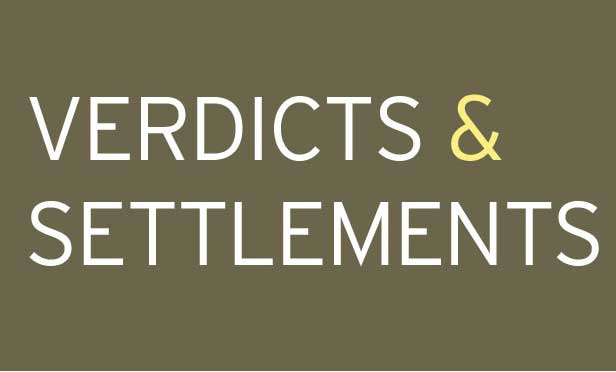Groups, Municipality Hit With $1.7M Verdict Over Baseball Injury
An Allegheny County jury has awarded $1.7 million to the family of a boy who was struck in the head by a foul ball during a youth baseball game and suffered a brain injury.
February 15, 2018 at 04:55 PM
5 minute read
Hoffman v. Borough of Sewickley
$1.7 million Verdict
Date of Verdict: Feb. 1.
Court and Case No.: C.P. Allegheny No. GD-16-004447.
Judge: Patrick Connelly.
Type of Action: Personal injury.
Injuries: Brain injury.
Plaintiffs Counsel: Alan Perer of Swensen & Perer, Pittsburgh.
Plaintiffs Experts: Gil Fried, West Hartford, Connecticut, sports and recreation expert; Dr. Stephanie Greene, neurosurgery, Pittsburgh.
Defense Counsel: Dennis Mulvihill of Robb Leonard Mulvihill, Pittsburgh.
Defense Experts: Dr. Thomas Sawyer, sports law expert, Muncie, Indiana; Lee Martin, architecture expert, Dublin, Ohio.
Comment:
An Allegheny County jury has awarded $1.7 million to the family of a boy who was struck in the head by a foul ball during a youth baseball game and suffered a brain injury.
The verdict came after an eight-day trial before Judge Patrick Connelly in the case Hoffman v. Borough of Sewickley. Along with awarding the money, the jury also found liability against two athletic associations and the municipality that owned the field where the injury occurred.
The plaintiff, Zachary Hoffman, was hit by the ball after it flew through a large gap in the fence of the dugout that his team was in.
According to attorney Alan Perer of Swensen & Perer, who represented the Hoffmans, the jury was likely persuaded by evidence that a similar incident occurred at the same field a year before, and that none of the dugout fences on the other fields where the teams regularly played had gaps that would have allowed for a foul ball to pass through.
“We're so happy with the jury's verdict and that he's going to get the best care he needs on an ongoing basis,” Perer said.
According to the verdict sheet, the jury found the Quaker Valley Recreation Association 50 percent liable, the Borough of Sewickley, which owned and operated the field, 40 percent liable, and the Avonworth Athletic Association 10 percent liable.
Thomas, Thomas & Hafer attorney John Giunta, who represented the Avonworth Athletic Association, which operated the team that Hoffman played for, said his client had reached a confidential settlement with the Hoffmans after closings, but prior to the verdict. He declined to comment further about the case.
According to court records, Hoffman was 11 in the spring of 2015 when he was hit on the head by the ball. Hoffman had been playing for the Avonworth Athletic Association against a Quaker Valley Recreation Association team. The teams were playing on a field that was owned and maintained by the Borough of Sewickley, and it was an away game for Hoffman's team.
The dugout was largely covered in wire fencing, but according to Hoffman's pretrial memo, there was an 11-foot-wide opening in the fence. The memo further noted that the first base line was less than 18 feet away from the player bench within the dugout.
The Hoffmans contended the gap in the fence went against Little League customs of having the dugout entirely fenced in. The plaintiffs also contended there were similar incidents where foul balls had struck players sitting on the dugout bench, including one where a player was hit in the chest a year before.
The field also failed to meet safety standards, and the teams further failed to provide sufficient warnings about the possibility of foul balls flying into the dugout, the Hoffmans alleged.
After the incident, Hoffman was taken to Sewickley Hospital where a CT scan showed he had a traumatic intracerebral bleed. He underwent a craniotomy that night.
According to his pretrial memo, Hoffman has suffered headaches since the accident, and he also has become more aggressive and has had difficulty controlling his emotions. The memo also noted that Hoffman has had trouble at school and has required special education and treatment.
In its pretrial memo, the borough and Quaker Valley Recreation Association said that being hit by a fly ball is a known risk of baseball, and that the field met the National Little League's rules regarding dugout fences.
Although the defendants each also contended that they should be immune from the suit, the jury also found that their conduct fell “substantially below” the generally practiced standards, which allowed the plaintiffs to overcome the immunity claims.
More than $1 million of the jury's award was for future medical expenses. The jury also awarded slightly more than $100,000 for past medical expenses, and $566,000 for past and future pain and suffering.
Dennis Mulvihill of Robb Leonard Mulvihill, who represented the borough and Quaker Valley Recreation Association, did not return a call seeking comment.
This content has been archived. It is available through our partners, LexisNexis® and Bloomberg Law.
To view this content, please continue to their sites.
Not a Lexis Subscriber?
Subscribe Now
Not a Bloomberg Law Subscriber?
Subscribe Now
NOT FOR REPRINT
© 2025 ALM Global, LLC, All Rights Reserved. Request academic re-use from www.copyright.com. All other uses, submit a request to [email protected]. For more information visit Asset & Logo Licensing.
You Might Like
View All



Trending Stories
- 1'A Death Sentence for TikTok'?: Litigators and Experts Weigh Impact of Potential Ban on Creators and Data Privacy
- 2Bribery Case Against Former Lt. Gov. Brian Benjamin Is Dropped
- 3‘Extremely Disturbing’: AI Firms Face Class Action by ‘Taskers’ Exposed to Traumatic Content
- 4State Appeals Court Revives BraunHagey Lawsuit Alleging $4.2M Unlawful Wire to China
- 5Invoking Trump, AG Bonta Reminds Lawyers of Duties to Noncitizens in Plea Dealing
Who Got The Work
J. Brugh Lower of Gibbons has entered an appearance for industrial equipment supplier Devco Corporation in a pending trademark infringement lawsuit. The suit, accusing the defendant of selling knock-off Graco products, was filed Dec. 18 in New Jersey District Court by Rivkin Radler on behalf of Graco Inc. and Graco Minnesota. The case, assigned to U.S. District Judge Zahid N. Quraishi, is 3:24-cv-11294, Graco Inc. et al v. Devco Corporation.
Who Got The Work
Rebecca Maller-Stein and Kent A. Yalowitz of Arnold & Porter Kaye Scholer have entered their appearances for Hanaco Venture Capital and its executives, Lior Prosor and David Frankel, in a pending securities lawsuit. The action, filed on Dec. 24 in New York Southern District Court by Zell, Aron & Co. on behalf of Goldeneye Advisors, accuses the defendants of negligently and fraudulently managing the plaintiff's $1 million investment. The case, assigned to U.S. District Judge Vernon S. Broderick, is 1:24-cv-09918, Goldeneye Advisors, LLC v. Hanaco Venture Capital, Ltd. et al.
Who Got The Work
Attorneys from A&O Shearman has stepped in as defense counsel for Toronto-Dominion Bank and other defendants in a pending securities class action. The suit, filed Dec. 11 in New York Southern District Court by Bleichmar Fonti & Auld, accuses the defendants of concealing the bank's 'pervasive' deficiencies in regards to its compliance with the Bank Secrecy Act and the quality of its anti-money laundering controls. The case, assigned to U.S. District Judge Arun Subramanian, is 1:24-cv-09445, Gonzalez v. The Toronto-Dominion Bank et al.
Who Got The Work
Crown Castle International, a Pennsylvania company providing shared communications infrastructure, has turned to Luke D. Wolf of Gordon Rees Scully Mansukhani to fend off a pending breach-of-contract lawsuit. The court action, filed Nov. 25 in Michigan Eastern District Court by Hooper Hathaway PC on behalf of The Town Residences LLC, accuses Crown Castle of failing to transfer approximately $30,000 in utility payments from T-Mobile in breach of a roof-top lease and assignment agreement. The case, assigned to U.S. District Judge Susan K. Declercq, is 2:24-cv-13131, The Town Residences LLC v. T-Mobile US, Inc. et al.
Who Got The Work
Wilfred P. Coronato and Daniel M. Schwartz of McCarter & English have stepped in as defense counsel to Electrolux Home Products Inc. in a pending product liability lawsuit. The court action, filed Nov. 26 in New York Eastern District Court by Poulos Lopiccolo PC and Nagel Rice LLP on behalf of David Stern, alleges that the defendant's refrigerators’ drawers and shelving repeatedly break and fall apart within months after purchase. The case, assigned to U.S. District Judge Joan M. Azrack, is 2:24-cv-08204, Stern v. Electrolux Home Products, Inc.
Featured Firms
Law Offices of Gary Martin Hays & Associates, P.C.
(470) 294-1674
Law Offices of Mark E. Salomone
(857) 444-6468
Smith & Hassler
(713) 739-1250






